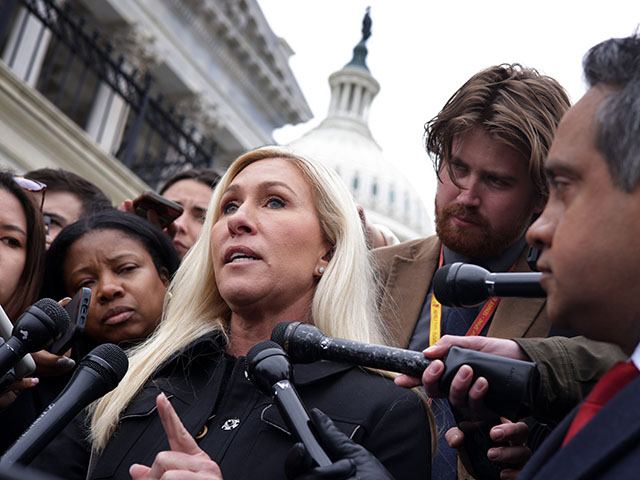
Speaker Mike Johnson (R-LA) unveiled a gambit to burst a legislative logjam and unleash a four-vote flood including a standalone vote on tens of billions in American taxpayer aid to Ukraine.
The post Speaker Johnson Unveils Scheme to Bring Ukraine Vote to House Floor appeared first on Breitbart.
Speaker Mike Johnson (R-LA) unveiled a gambit to burst a legislative logjam and unleash a four-vote flood including a standalone vote on tens of billions in American taxpayer aid to Ukraine.
The plan appears to exploit the sense of urgency in Congress for sending aid to Israel in the wake of Iranian missile attacks in a scheme to bypass Republican animosity towards continuing to fund Ukraine’s war against Russia.
Johnson unveiled his plan to his colleagues during a Monday night House Republican Conference meeting. His plan is to hold a single vote on a rule — the product specifying which legislation heads to the House floor as well as time and amendment considerations — which, if successful, would unlock four separate votes on aid to Ukraine, Israel, and Taiwan as well as a TikTok bill.
The rule only needs majority support on the floor to pass. If it does, each of the four pieces of legislation would only need majority support as well.
The move would enable Johnson — once an ardent foe to continued American subsidization of Ukraine who has flip-flopped to adopt a fervency for more funding — to avoid passing yet another bill under “suspension of the rules.”
Most recently, in March, Johnson ushered through a $1.2 trillion spending bill under suspension — a process that requires two-thirds support but can enable a speaker to pass bills opposed by a significant chunk of his own party. Johnson passed that spending bill over the objections of the majority of Republicans voting against it, violating the informal Hastert Rule that a Republican speaker not bring forward legislation unless the majority of his conference supports it.
After his conversion on Ukraine, Johnson considered suspending the rules to pass more aid to Ukraine, telling Politico in March, “I think it is a stand-alone, and I suspect it will need to be on suspension” regarding further foreign aid.
Rep. Marjorie Taylor Greene (R-GA) likely halted those plans by threatening to force a vote to eject Johnson from the speakership. Greene introduced a motion in March to vacate the chair — the same procedural vehicle used to eject Speaker Kevin McCarthy (R-CA) in October 2023.
While she has not drawn a “red line” on what would trigger her to force a vote on the motion, Greene has made clear that Johnson must not violate the will of the Republican base, which strongly opposes more Ukraine spending.
It is uncertain the rule will receive a floor vote. First, the rule must go before the House Rules Committee. And Johnson still must reveal the specifics of the four pieces of legislation the rule would unlock as well as the amendment and debate structure.
In years past, a rule’s passage in committee was little more than a formality, as the committee — known colloquially as “the Speaker’s committee” — was packed with members loyal to the Speaker and broader Republican establishment.
But this Congress has been an outlier after former Speaker McCarthy allowed three conservative bloc members onto the powerful committee as part of a series of concessions to gain the gavel for himself. McCarthy and especially Johnson have suffered heartburn all Congress endeavoring to push the committee to green light Speaker priorities.

House Minority Leader Kevin McCarthy (R-CA) speaks during the House Republicans news conference in the Capitol to discuss defunding the Homeland Security Departments Disinformation Governance Board on May 11, 2022. (Bill Clark/CQ-Roll Call, Inc via Getty Images)
The Rules Committee is heavily tilted to favor the party in power. The current breakdown is nine Republicans to four Democrats. But the three conservatives on the committee, Reps. Thomas Massie (R-KY), Ralph Norman (R-SC), and Chip Roy (R-TX), can block a rule if banding together.
Other factors reveal Johnson’s likely thinking on the strategy.
The House already passed legislation this Congress to provide aid to Israel and to address the Chinese Communist Party’s influence through TikTok, two of the four subjects Johnson now calls to address. Those bills await Senate action.
Johnson’s at-a-glance perplexing decision to include two subjects already handled by the House appears to be part of that strategy to enable a stand-alone vote on Ukraine.
The House passed its earlier bill to aid Israel in November 2023. That bill included $14.6 billion dollar bill paid for by cuts to the Internal Revenue Service.
It was widely seen at the time as a significant achievement in Johnson’s nascent speakership, which has seen few victories since.
Yet in the days after Iran’s missile attacks on Israel, Johnson has avoided the usual Congressional calls for the opposite chamber to take up the other’s legislation, with Johnson notably not asking the Senate to take up the House-passed Israel aid bill.
Instead, he appears to be exploiting the urgency of aiding Israel — a popular cause within his conference and among most House Democrats — to unleash Ukraine funding.
By lumping multiple issues which animate large blocks of each party’s base, Johnson might be gambling he can woo Democrats to cross the aisle and vote for a Republican rule, consolidate Republican support, and protect his speakership.
On the Republican side, by including multiple pieces of legislation in the lone rule vote, Johnson is hoping to entice anti-Ukraine Republicans who don’t want to block aid to Israel to vote for the rule.
Importantly, he also could insulate himself from criticism from conservatives — most notably Greene — who might otherwise oust him from the Speaker’s office for bringing a standalone rule vote on Ukraine.
With the four-subject rule, Johnson can claim Ukraine aid’s inclusion was necessary for other priorities — most notably, Israel — and that his plan allowed each Member the opportunity to oppose the stand-alone Ukraine aid.
On the Democrat side, Johnson could be relying on the complexity of the House’s parliamentary procedure.
It is incredibly unusual for an opposition party to vote for a majority party’s rule — either in the Rules Committee or on the House floor — even if the opposition supports the underlying legislation.

Rep. Marjorie Taylor Greene (R-GA) speaks to reporters outside of the U.S. Capitol Building after a vote on a funding bill that would avert a government shutdown on March 22, 2024 in Washington, DC. (Alex Wong/Getty Images)
But Johnson could hope that enough Democrat members will make the rare crossover on a rule vote to avoid endeavoring to explain parliamentary ins-and-outs to constituents angry that their Congressman blocked a vote on such highly motivating issues like aid to Israel and Ukraine.
In addition to the details of the underlying pieces of legislation, Johnson and news Rule Committee Chairman Michael Burgess (R-TX) must determine the structure of debate and if amendments will be permitted.
Johnson might pursue a rule which allows several, or more, amendment votes from conservatives in opposition to Ukraine aid as yet another strategy to insulate himself from criticism over the issue.
Greene, leaving Monday night’s meeting, called Johnson’s scheme “another wrong direction for Speaker Johnson,” although she did not commit to force a motion to vacate until more details are revealed.
Conservatives have steadily called for Congress to address the chaos at its own border before sending billions more to assist Ukraine with its border. Yet Johnson’s plan as laid out to his colleagues does not include a border component.
The timeline moving forward is not certain. Johnson is likely to violate conference and House rules requiring 72 hours to review legislation before a vote.
Additionally, the Ukraine vote might violate the Hastert Rule.
Bradley Jaye is a Capitol Hill Correspondent for Breitbart News. Follow him on X/Twitter at @BradleyAJaye.




